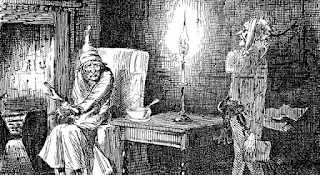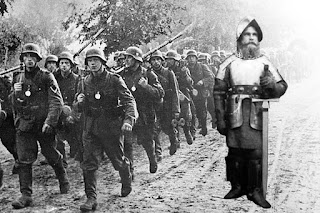Athenodorus' Ghost and Pliny the Younger: The Story Behind Western Civilization's First Paranormal Encounter
Pliny the Younger, or Gaius Plinius Caecilius Secundus, as he would have been known in Latin to his Roman contemporaries began what is quite possibly Western Civilization’s first ever account of a haunted house with these ominous words:
“There was in Athens, a large and spacious, but ill-reputed and pestilential house.” (from Letters VII: 27 Pliny the Younger)
After the famed orator and statesman Cicero, Pliny the Younger is the Roman world’s best known letter writer and politician of the first and second centuries A.D. Today there are ten surviving volumes of letters, over 350 missives in total, that survive and bear the name of Pliny the Younger. (Beard pp. 424-425)
He lived between the years 60 A.D. and circa 115 A.D, reaching heights of great fame for his learning and erudition throughout the Roman Empire, before dying suddenly at around the age of fifty-five while traveling away from Rome in Asia Minor in what is present day Turkey. At least, this is how historians today believe that Pliny the Younger died, as there are no letters attributed to him dated after the year 113.
As it was, Pliny the Younger grew up in northern Italy as a member of a powerful and wealthy Roman aristocratic family. His equally famous uncle, who has become known to history as Pliny the Elder, was a Roman natural philosopher and military hero in his own right, who was quite possibly the most famous person to be killed at Pompeii by the eruption of Mount Vesuvius in the year 79 A.D.
In terms of fame and fortune Pliny the Younger would live to top even his famous uncle who commanded victorious Roman legions in battle. Pliny the Younger would serve twice as a Roman Senator under both the Emperors Nerva and Trajan. He was personal friends with the historian Tacitus, and he gave to posterity our only eye-witness account of the eruption of Mount Vesuvius that destroyed the famed city of Pompeii. His many letters placed him among Roman writers on par with only Virgil and Cicero in terms of respect and admiration.
 |
| Pliny the Younger |
Pliny the Younger, known to history as a famed Roman Senator, historian and eloquent letter writer, also quite possibly recorded the first paranormal encounter in the annals of Western Civilization. In a sense, Pliny the Younger could be considered history’s first Ghost Hunter or paranormal investigator. At the very least, his story, which he wrote in a letter to a friend named Sura sometime around the year 100 A.D. is the first recorded instance that we in the West have of a haunted house as we know it today.
The story that Pliny the Younger included in his letter to his friend Sura, was perhaps about one-hundred years old at the time of his writing it down. Undoubtedly the story had been passed down through word of mouth for decades throughout the Roman and Hellenistic world’s before Pliny decided to record it in print.
It concerned a Greek named Athenodorus.
Not much is known about who this Athenodorus actually was, or about how Pliny the Younger came to be acquainted with his story. Some researchers believe that Athenodorus is simply a Latinization of the phrase, “the one who is from Athens,” and that in writing the tale of the haunted house to his friend that Pliny the Younger was simply attempting to write a fictional moralistic ghost story and that, therefore, Pliny was in essence the western world’s first horror writing hack.
This may be true, or partially true at any rate, however most historians today agree that the Athenodorus to which Pliny makes reference in his letter was, in fact, a real historical person.
Today it is believed by most researchers that in his letter Pliny the Younger was referring to an affluent and wealthy man named Athenodorus Cananites. Athenodorus Cananites was a Greek Stoic philosopher who flourished during the time of Christ and lived between the years 74 BCE and 7 A.D. meaning that Pliny the Younger would have been born over a full half century after Athenodorus Cananities death.
Athenodorus Cananites was born in the town of Canana in a place the Greeks called Tarsus, modern day Turkey, along the Mediterranean coast. Athenodorus’ father known as Sandon was a famous philosopher in his own right and is recorded in inscriptions as a, “Son of Hellanikos'' meaning that Athenodorus was most likely an Athenian citizen from birth and part of a larger Greek diaspora that settled the Mediterranean world during the first century BCE.
 |
| Athenodorus Cananites from Encyclopedia Britannica |
What we do know about the person Athenodorus Cananites apart from snippets contained in Pliny the Younger’s letters to his friends is that he was the son a famous Stoic philosopher and that growing up he had access to many of the same tutors as future Roman Emperors. We also know that sometime around the year 45 BCE, when he was aged about thirty, that Athenodorus moved to Rome to work for the Emperor Octavian who appears to have been a friend of the family.
This much is known about Athenodorus, the man who would give his name to Western Civilization’s first recorded ghostly encounter, but not much else. And the story that Pliny gives us concerns the city of Athens, where Athenodorus probably lived as a young man when he was in his twenties, and not the city of Rome where we know that Athenodorus moved to in order to work for the Emperor when he was in his thirties.
Anyway, Pliny the Younger’s letter states that Athenodorus chose to rent this large and supposedly “pestilential” house because the rent was so cheap since everybody in Athens at the time was scared to go near it. Pliny tells us the reason that the Athenian locals lived in fear of the large house:
“In the dead of night a noise resembling the clashing of iron was frequently heard, which if you listened attentively sounded like the rattling of fetters…”
Pliny mentions that the house was haunted by a ghost in chains who came out in the middle of the night in a scene that would make Poe or Charles Dickens smile and nod in recognition.
He goes on to refer to all previous tenants of the house as having, “Passed sleepless nights under the most dismal terrors imaginable,” though what these dismal terrors exactly were for the tenants Pliny does not elaborate on.
Apparently, Athenodorus who at that time was most probably a student, and therefore broke, came to town and looked for places where the rent was cheap. Pliny tells us of Athenodorus and the haunted house that, “The extraordinary cheapness raised his suspicions; nevertheless when he heard the whole story, he was so far from being discouraged, that he was more strongly inclined to hire it.”
Uh oh….history’s first example of a smug intellectual, in this case the so-called Stoic Philosopher Athenodorus, disbelieving, mocking and even laughing at the supernatural world. The end result of this, as anyone who has ever seen a horror flick knows, can’t possibly be good.
The first night that Athenodorus stayed in the house Pliny the Younger tells us started to, “(P)ass with the usual silence,” but then, sure enough, “began the clanking of iron fetters.”
But, Athenodorus being the steadfast intellectual and Stoic that he was, “(N)either lifted up his eyes nor laid down his pen, but closed his ears and concentrating his attention continued to write.”
We can see echoes of Pliny the Younger himself, one of the western world’s most renowned letter writers, in his own description of the young student Athenodorus.
 |
| An ancient fragment from one of Pliny's letters |
Anyway, Athenodorus continued to write, and write and write through the clanking of chains and howling of the ghost which grew more angry by the moment, until he had no choice but to turn around and witness the apparition that stood before him-- a starving old man in rags cloaked in chains and howling wildly like an ancient Athenian ghost of Jacob Marley from Charles Dickens’ A Christmas Carol.
Apparently, according to Pliny the Younger, the ghost became so enraged that he rattled his chains directly over Athenodorus’ head while he sat at his writing desk.
He, the ghost, beckoned for Athenodorus to follow him.
Of Athenodorus’ actions Pliny wrote:
“Upon this he immediately took up his lamp and followed it. The ghost slowly stalked along as if encumbered by its chains, and having turned into the courtyard of the house, suddenly vanished. Athenodorus marked the spot with a handful of grass and leaves. The next day he went to the magistrates and advised them to order that spot to be dug up. There they found bones commingled and intertwined with chains…”
The skeleton was promptly dug up and given a proper burial in a cemetery at the public's expense. After being laid to rest properly the haunting of the large so-called “pestilential” house ceased immediately.
 |
| The Ghost of Jacob Marley from Dickens' A Christmas Carol |
Is any of this true?
Well, maybe. It would appear that Pliny the Younger, one of ancient Rome’s most well respected intellectuals, believed in the story for he says as much in his letters, but even he admits that he had only heard the story secondhand from a freed slave named Marcus who according to Pliny had, “(S)ome tincture of letters,” meaning that this former slave could at least read and write a little.
In the Roman world slavery was all too common, but it was not necessarily a permanent state of life into which a person was born into and could never get out of, therefore, a story from a freed slave like the one that related the tale of Athenodorus’ Ghost would not necessarily have been dismissed as the fabrication of an ignorant mind.
The truth behind ancient oral traditions and the tales of ancient Rome and ancient Greece may never entirely be known. But it is best for us all to remember that until the very turn of the twentieth century, most academics believed that the fabled city of Troy and the Trojan War of Homer’s Odyssey and Iliad was nothing more than a rousing tale of fiction created by poets to entertain ancient Greek audiences. But today we know that the city of Troy and the death and destruction of the Trojan War was all too real and that Homer was not just a poet, but rather, he might best be considered one of history’s first popular historians.
Who knows, perhaps one day, we might say the same thing about Athenodorus’ Ghost and the story of the first paranormal encounter in the history of Western Civilization.
References:
Beard, Mary. SPQR: A History of Ancient Rome. Pub. by Liveright
Publishing Corporation a Division of W.W. Norton 2015
http://vroma.org/vromans/hwalker/Pliny/Pliny07-27-E.html




Comments
Post a Comment